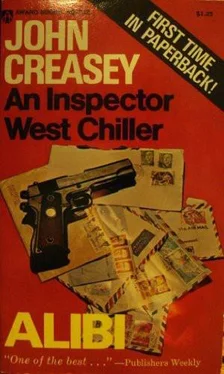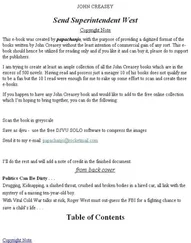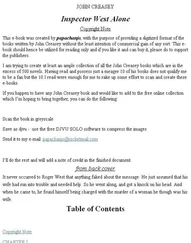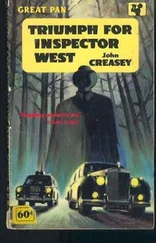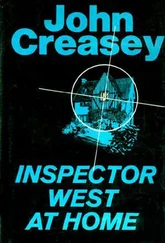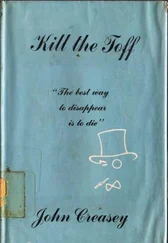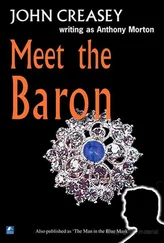John Creasey - Alibi
Здесь есть возможность читать онлайн «John Creasey - Alibi» весь текст электронной книги совершенно бесплатно (целиком полную версию без сокращений). В некоторых случаях можно слушать аудио, скачать через торрент в формате fb2 и присутствует краткое содержание. Жанр: Старинная литература, на русском языке. Описание произведения, (предисловие) а так же отзывы посетителей доступны на портале библиотеки ЛибКат.
- Название:Alibi
- Автор:
- Жанр:
- Год:неизвестен
- ISBN:нет данных
- Рейтинг книги:4 / 5. Голосов: 1
-
Избранное:Добавить в избранное
- Отзывы:
-
Ваша оценка:
- 80
- 1
- 2
- 3
- 4
- 5
Alibi: краткое содержание, описание и аннотация
Предлагаем к чтению аннотацию, описание, краткое содержание или предисловие (зависит от того, что написал сам автор книги «Alibi»). Если вы не нашли необходимую информацию о книге — напишите в комментариях, мы постараемся отыскать её.
Alibi — читать онлайн бесплатно полную книгу (весь текст) целиком
Ниже представлен текст книги, разбитый по страницам. Система сохранения места последней прочитанной страницы, позволяет с удобством читать онлайн бесплатно книгу «Alibi», без необходимости каждый раз заново искать на чём Вы остановились. Поставьте закладку, и сможете в любой момент перейти на страницу, на которой закончили чтение.
Интервал:
Закладка:
“My God!” Roger suddenly exclaimed aloud.
He looked round, and saw a telephone. He grabbed it, water dripping, instrument slipping from his fingers. An operator answered.
“Detective Sergeant Danizon, please. He’s in Mr. Art—”
“I know where he is, sir.”
There was only a moment’s pause before Danizon answered, but in this pause Roger’s thoughts were racing, and he spoke as Danizon came on the line.
“Have you come across any documents or files showing who represents Allsafe legally?”
“Well, yes, sir,” Danizon said. “I was struck by the coincidence. It’s Warrender, Clansel and Warrender, of Lincoln’s Inn.”
“So it is,” said Roger tautly. “Telephone Rachel War- render and ask her to meet me at the Yard in an hour. You’d better be there, too. I’ll be out of here in five minutes, and I’m going over to the Festival Hall, to see the commander.”
“But if you interrupt him at the conference, sir—” Alarm thickened Danizon’s voice.
“I’ll either be out on my neck or the next deputy commander,” Roger said drily. “I know.”
In ten minutes he was outside in the Strand, facing a battery of reporters and photographers. A large crowd had gathered, hundreds of people watching the police taking photographs and measurements of the spot where Phillipson had fallen. As West appeared, the crowd surged towards him.
“Just a moment, Super.”
“Hold it.”
“Is it true that you were in the room when Phillipson jumped out of the window?”
“What’s it all about, Handsome?”
One man said in a very deep voice, “Can you give us a statement, sir?”
All this time Roger was pushing his way through the surging mass of onlookers, two constables trying to clear a path for him. Cameras were being held high, photographers were on the roofs of cars, on window ledges, even on one another’s shoulders.
“Was it suicide?” one man called.
“Or was he pushed?”
“Just a brief statement, sir,” pleaded the man who had asked before.
Through the crowd Roger could just see the head and shoulders of Detective Constable Ashe. He must be near the car, thought Roger, struggling towards him in the wake of the two constables. At last he reached it, the two policemen as well as Ashe protecting him as he started to get in. Then, standing on the side of the car and supporting himself by the door and a policeman’s shoulder, he faced the crowd.
“I’ll have a statement of some kind ready at the Yard by seven-thirty,” he called in a clear voice. “That’s a promise.”
There must have been fifty cameras snapping him as he stood there. All questions stopped, he got into the car unhindered, and the crowd drew back, allowing Ashe to drive him away.
Fifteen minutes later he was entering the Royal Festival Hall. This hall, London’s musical pride since the 1951 Exhibition, was often used during the day for conferences. On this particular day it was almost filled with policemen from over thirty countries of Europe, including each of the Iron Curtain countries. Roger went to a table marked Organisation and spoke to a grey-haired woman whom he vaguely recognised as from the Yard; the Metro-politan Police were responsible for all the arrangements here.
“Good afternoon, Mr. West.”
“Good afternoon. I must speak to Mr. Coppell,” Roger said.
“Oh, no !” she exclaimed. “The president of the conference is making his closing speech. You can’t hear a pin drop in the hall, sir.”
Roger hesitated only for a moment before saying positively, “Five minutes is the absolute limit I can wait.”
“Oh, but it will be an hour at least! I daren’t disturb him.”
“Do you know where Mr. Coppell is?” asked Roger.
“He’s about halfway down on the left-hand side of the centre aisle, but the commissioner’s with him.”
Roger said, “Thank you,” and opened a door into the huge auditorium. A man was standing on the huge stage, small, dark-haired, pale-faced, vivid in a single spotlight. He was Karl Schmidt of West Germany, one of the world’s great policemen and an orator in German, French and English. The woman was quite right; there was utter stillness and there was magnetism in that clear, only faintly guttural voice.
Roger felt acutely self-conscious, and very glad of the carpeted floor. He passed rows and rows of men, with only here and there a woman, but no one appeared to take the slightest notice of him. He was scanning the heads for Coppell’s, which he would recognise—ah! There he was, only one seat off the aisle. Roger drew nearer, and gulped, for the commissioner was in the aisle seat and he could see how intent Trevillion was on the speaker.
. . . “ . . . and if we are to bring this dre adful wave of crime to an end . . .”
Roger summoned up all his courage and bent forward. “Excuse me, sir,” he whispered, touching Trevillion’s arm, “I must see the commander.”
“What —!” Trevillion ejaculated.
“ Shhh ! ” someone hissed.
“ What? ” muttered Trevillion.
Now Coppell had been disturbed, and he turned too. There was just enough light to show Roger’s face, as he breathed, “It’s vitally urgent, sir.”
“I’ll come,” whispered Coppell.
Roger turned and made his way back, noticed this time by people near the scene of the interruption, aware of many eyes turned towards him. But even so, most eyes were still riveted on the figure on the stage.
“. . . we have, as we well know, many political problems and social problems but none of us, whatever our ideology, our faith, wants crime on the scale that we now have it. We must find a set of rules to which we can all subscribe; must have co-operation at its closest in the investigation of certain crim es, such as murder for gain . . .”
Roger went into the foyer, and held the door open. The woman at the table was staring intently; her eyes widened when first Coppell and then the commissioner came out. Roger closed the door quietly, and Coppell said in a growl, “Your reason had better be good.”
Trevillion was staring at Roger in a puzzled way, not at all censorious or angry; just puzzled. Roger led the way towards a place at the foot of a staircase where no one could come upon them unawares, and overhear what was said.
“Well?” Coppell growled again; whether out of anger or to impress the commissioner, Roger couldn’t guess.
“Phillipson of the Globe has just committed suicide by throwing himself out of the window of the Allsafe managing director’s office,” Roger stated. “Benjamin Artemeus, of Allsafe, is under arrest on a charge of assisting Phillipson in an attempt to commit grievous bodily harm. Phillipson and Artemeus were conspiring to get control of all the security companies of consequence in the country.
They used me as a pawn to win shareholders’ votes. All of these facts can be established from a tape-recording made while I was in Artemeus’s office. I have ordered police control of the Allsafe administrative offices and our men are in possession.”
Roger paused, as much for breath as anything else. Neither of the others spoke or moved, and at last he went on, “I believe the editorial and administrative offices of the Globe should be searched forthwith, although it is conceivable that some papers have already been destroyed. I also believe that all the directors and executives of the security companies concerned should be interrogated and their homes searched for incriminating docu-ments. Further, I believe that the law firm of Warrender, Clansel and Warrender is involved, and I think its offices and the homes of its partners should be searched, at once.”
Читать дальшеИнтервал:
Закладка:
Похожие книги на «Alibi»
Представляем Вашему вниманию похожие книги на «Alibi» списком для выбора. Мы отобрали схожую по названию и смыслу литературу в надежде предоставить читателям больше вариантов отыскать новые, интересные, ещё непрочитанные произведения.
Обсуждение, отзывы о книге «Alibi» и просто собственные мнения читателей. Оставьте ваши комментарии, напишите, что Вы думаете о произведении, его смысле или главных героях. Укажите что конкретно понравилось, а что нет, и почему Вы так считаете.
